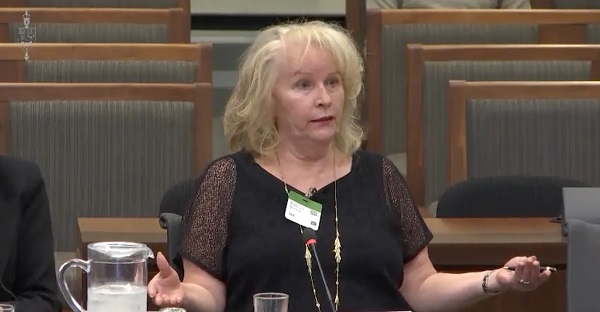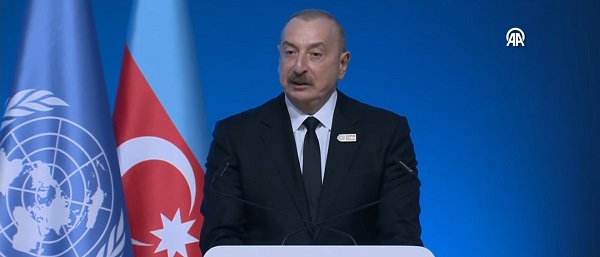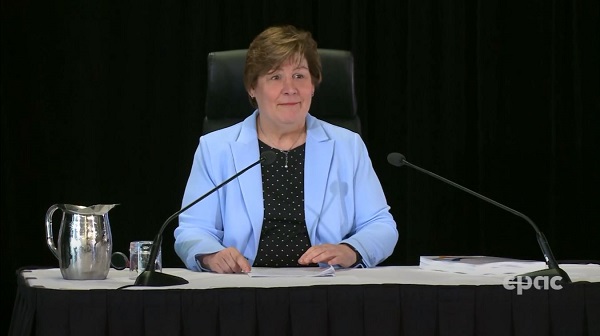
By Alexandra Keeler
An Ottawa mother, who lost her daughter to addiction, is frustrated by Recovery Care’s failure to help her opioid-addicted son
Masha Krupp has already lost one child to an overdose and fears she could lose another.
In 2020, her 47-year-old daughter Larisa died from methadone toxicity just 12 days into an opioid addiction treatment program. The program is run by Recovery Care, an Ottawa-based harm reduction clinic with five locations across the city, which aims to stabilize drug users and eventually wean them off more potent drugs.
Krupp says she is skeptical about the effectiveness of the support and counseling services that Recovery Care claims to provide and believes the clinic was negligent in her daughter’s case.
On Oct. 22, the Ottawa mother testified before the House of Commons Standing Committee on Health, which is studying Canada’s opioid epidemic.
In her testimony, Krupp said her daughter was prescribed 30mg of methadone — 50 per cent more than the recommended induction dose — and was not given an opiate tolerance test before starting the program. Larisa received treatment at the Bells Corners Recovery Care location.
Krupp’s 30-year-old son, whom Canadian Affairs agreed not to name, has been a patient at Recovery Care’s ByWard Market location since 2021, where he receives a combination of methadone and hydromorphone, another prescription drug administered through the treatment program.
“Three years later, my son is still using fentanyl, crack cocaine and methadone, despite being with Dr. [Charles] Breau and with Recovery Care for over three years,” Krupp testified.
“About four weeks ago, I had to call 9-1-1 because he was overdosing,” Krupp told Canadian Affairs in an interview. “This is on the safer supply program … three years in, I should not be calling 9-1-1.”
Open diversion
Founded in 2018, Recovery Care is a partner in the Safer Supply Ottawa initiative. The initiative, which is led by Ottawa Public Health and managed by the nonprofit Pathways to Recovery, provides prescription pharmaceutical opioids to individuals who are at high risk of overdose.
Pathways to Recovery works with a network of service providers throughout the city — including Recovery Care — to administer safer supply.
Krupp says she supports the concept of safer supply, but believes it needs to be administered differently.
“You can’t give addicts 28 pills and say ‘Oh here you go,’” she said in her testimony. “They sell for three dollars a pop on the street,” she said, referring to the practice of some individuals selling their prescribed medications to fund purchases of more intense street drugs like heroin and fentanyl.
Krupp says she sees her son — and other patients of the program — openly divert their prescribed medications outside of the Recovery Care clinic in ByWard Market, where she parks to wait for him.
“[B]ecause there’s no treatment attached to [my son’s safer supply], it’s just the doctor gives him all these pills, he diverts them, gets the drugs he needs, and he’s still an addict,” Krupp said in her testimony.
Donna Sarrazin, chief executive of Recovery Care, told Canadian Affairs that Recovery Care has measures to address diversion, including security cameras and onsite security staff.
“Patients are educated at intake and ongoing that diversion is not permitted and that they could be removed from the program,” she said in an emailed statement.
“Recovery Care works to understand diversion and has continued to progress programs and actions to address the issues. Concerns expressed by the community and our teams are taken seriously,” she said.
Krupp says she has communicated her concerns about her son reselling his prescribed medications to his doctor, Dr. Charles Breau, both in-person and through faxed letters. “I never hear back from the doctor. Never,” she said.
Krupp also said in her testimony that police have spoken to her son about his diversion.
Breau did not respond to inquiries made to his clinical teams at Recovery Care or Montfort Hospital, a teaching hospital affiliated with the University of Ottawa.
Sarrazin said Breau is not able to comment on patient or family care.
In Krupp’s view, the safer supply program would be more successful if drug users were required to take prescribed medications under supervision.
“If he was receiving his hydromorphone under witnessed dosage and there was a treatment plan attached to it, I believe it would be successful,” she said.
Dr. Eileen de Villa, the City of Toronto’s medical officer of health, reinforced this point at the Oct. 22 Health Committee meeting. She said Toronto Public Health’s injectable opioid agonist therapy program — which combines observed administration with a treatment plan — has seen “incredible results.”
De Villa shared a case of a pregnant client who entered the program. “She went on to have a successful pregnancy, a healthy baby, has actually successfully completed the treatment, and is now housed and has even gained custody of her other children,” she said.
Subscribe for free to get BTN’s latest news and analysis, or donate to our journalism fund.
‘An affront to me’
Krupp also says Recovery Care fails to deliver on its promise of supporting patients’ mental health needs. Recovery Care’s website says its clinics offer “mental health programs which are essential to every treatment plan.”
Krupp and her son’s father have both requested a clear treatment plan and consistent counselling for their son. But he was started on safer supply after participating in only one virtual counselling session, she says.
She says Recovery Care has only one mental health counselor who services four of Recovery Care’s clinics. “If you’re getting $2-million-plus a year in funding, you should be able to staff each clinic with one on-site counselor five days a week,” she said.
Instead of personalized assistance, her son received “a sheaf of photocopies” offering generic services like Narcotics Anonymous and crisis helplines. “It’s almost an affront to me, as a taxpayer and a mother of an addict,” Krupp said.
Krupp says that, following her testimony to the parliamentary committee, Breau reached out to offer her son a mental health counseling session for the first time.
Sarrazin told Canadian Affairs that patients are encouraged to request counseling at any time. “Currently there is no wait list and appointments can be booked within 1 week,” she said in her emailed statement.
Class actions
Today, Krupp is considering launching a class-action lawsuit against Health Canada and the Government of Canada, challenging both the enactment of safer supply and the loosening of methadone dispensing requirements in 2017. She believes these changes contributed to her daughter’s death in 2020.
She is also considering joining an existing class-action lawsuit in B.C., which alleges Health Canada failed to monitor the distribution of drugs provided through safer supply programs.
The Pathways to Recovery initiative received $9.69-million in funding from Health Canada from July 2020 to March 2025. In June 2023, Health Canada allocated an additional $1.9 million to expand Ottawa’s safer supply program across five sites and improve access to practitioners, mental health support, housing and other services.
“I want to see that money being put to a recovery based treatment, not simply people going in and out and getting their medications and just creating this new sub-layer of addicts,” Krupp said.
This article was produced through the Breaking Needles Fellowship Program, which provided a grant to Canadian Affairs, a digital media outlet, to fund journalism exploring addiction and crime in Canada. Articles produced through the Fellowship are co-published by Break The Needle and Canadian Affairs.


















